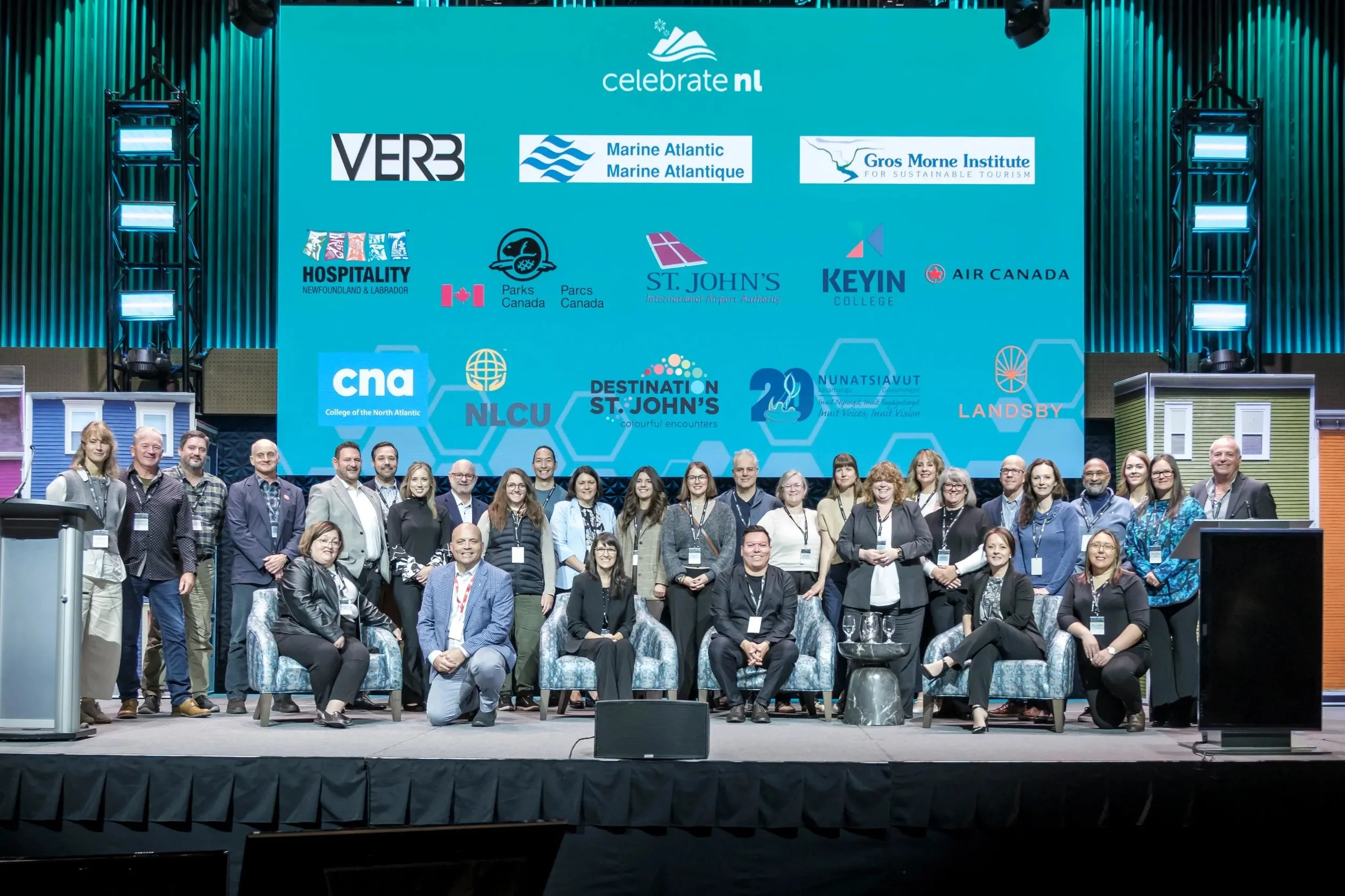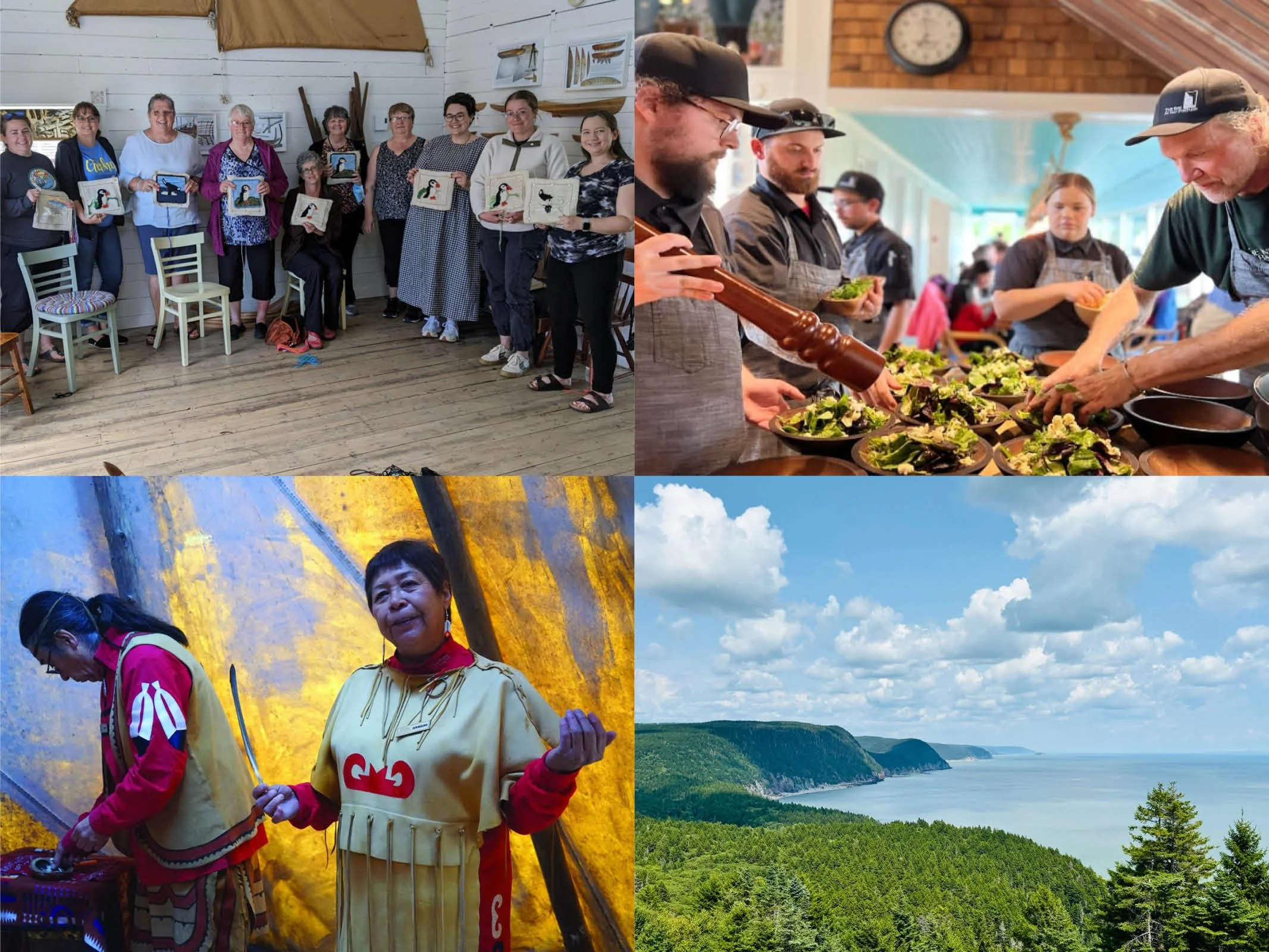Start with Who: Truth-Rooted Storytelling in Travel & Tourism
Photo via IMPACT Sustainability Travel and Tourism Atlantic Regional Event.
I recently had the privilege of speaking at the IMPACT Sustainability Travel and Tourism Atlantic Regional Event in St. John’s, Newfoundland and Labrador, a gathering that reminded me of the power of people coming together with openness, humility, and a shared desire to do better. There’s something grounding about standing on the edge of the Atlantic. This wasn’t just a conference; it was a conversation about care, accountability, and the future of travel. I left with deep gratitude and a renewed sense of purpose.
Before We Begin: Who Are We Here For?
Before diving into frameworks or metrics, I invited the audience to pause and think about the Who in their work—the real people their businesses and destinations touch. Not just their teams, but the full ecosystem: residents, partners, suppliers, travellers, and the land itself and the people whose territory we’re on.
Can you see their faces?
Do you know their names?
Those are the people we must hold in mind when we talk about purpose.
When “Why” Isn’t Enough
For nearly two decades, my work as a tourism brand consultant revolved around helping destinations and businesses articulate their Why—that deeper reason they exist beyond profit. Simon Sinek’s Golden Circle offered a framework that felt like the key to unlocking purpose-driven brands: Why > How > What. It guided so many of us toward meaning rather than marketing.
Over time, I began to feel something was missing. I would help craft thoughtful purpose statements, yet there was often a gap—a space between what was said and what was lived. And sometimes, another space between what was lived and what was left unspoken.
That gap led me to discover Michel Bachmann’s idea of Start With Who, a quiet but powerful counterpoint to Sinek’s Start With Why. Bachmann’s work suggests that purpose doesn’t begin with a statement. It begins with identity. With people. With relationships and shared values.
When I first read this, it landed deeply. I realized that much of the tourism sector, and my own work, had focused so intently on defining purpose that we’d sometimes skipped the essential step of understanding who we truly are and who we serve. Without that grounding, purpose can become abstract—even inauthentic. That’s when organizations slip into the uncomfortable middle ground between greenwashing and greenhushing—either overstating what they can’t prove or staying silent out of fear of getting it wrong.
I reflected on my earlier thoughts about this framework (you can read that here), and I proudly changed my mind. That’s what being a good sustainability professional is—staying open-minded and deeply humble. We learn and grow by rethinking our assumptions and embracing new perspectives. Always.
Two Stories: Airbnb and UnTours
A good example of this disconnect is Airbnb. Their purpose: “to create a world where anyone can belong anywhere.” Sounds inspiring, right? But belonging isn’t something that can be scaled without consent. The company never rooted that purpose in who it truly served. They didn’t sit down with neighbourhood associations, talk with residents, or ask what “belonging” meant in the places they entered.
As a result, belonging became a slogan rather than a lived experience. Rapid expansion displaced locals, housing costs soared, and short-term rentals reshaped communities in ways that contradicted the brand’s stated mission. That’s not lying; it’s purpose-washing. Not because the intention was bad, but because the Who at the center of the story was missing.
Then there’s UnTours, which offers a very different example. Founded over fifty years ago by Hal Taussig, long before sustainability became a buzzword, UnTours built a model of slow, human-centred travel. Travellers stay in local apartments, meet their hosts, and live daily life as guests, not consumers.
Hal lived his values so deeply that he donated 100% of the company's profits to the UnTours Foundation, which invests in community-based enterprises worldwide. Their storytelling is powerful because it’s true. They introduce travellers to their local UnGuides by name. People like Urs, who also happens to be an excellent yodeller. Some of UnGuides have worked with UnTours for generations. Their Why, “Travel differently. Change the world,” isn’t marketing language; it’s simply who they are.
And that’s why the company has endured for half a century and became the first Certified B Corporation in the world. That’s what it looks like to be rooted in Who.
The Call Back to Relationship
We don’t have to look far for similarities across Atlantic Canada. From Fogo Island Inn and the Shorefast Foundation to community-run cafés and co-operative tourism initiatives, this region is filled with stories that show tourism can thrive through reciprocity and respect. They’re examples of belonging, of people who understand that Who isn’t a branding exercise. It’s about relationships and responsibility.
I will create another post with many examples, particularly from Newfoundland and Labrador, soon, because it deserves a full conversation. It’s incredibly special.
When we start with Who, we naturally engage our stakeholders—residents, Indigenous partners, small business owners, travellers and begin to see ourselves as part of a living system.
From Circles to Spirals
Bachmann’s Golden Spiral expands on Sinek’s Golden Circle by placing Who at the center and spiralling outward through Why and so on. It’s called a spiral because it evolves; it’s not a static model but a living relationship that grows with respect to place and time (where and when). If you’re familiar with the Flourishing Business Canvas, you’ll start to see the complementary nature of these two frameworks and how they can be interwoven to discover truth-rooted stories.
It’s also important to understand that Why and Who are in relationship with one another to create a deeper, more resonant story. Not in competition.
Why is the ambition. Who is the potential to deliver on that collective ambition. The potential of people, place and the entire living system.
Why is a good story. Who is lived experience which makes a good story infinitely richer and meaningful.
Why adapts as the world changes. Who takes a stand to change the world.
Why is an invitation. Who sets healthy boundaries. Not everyone shares your values, and that’s okay.
This way of thinking helps us avoid both greenwashing and greenhushing because when purpose is rooted in shared values and lived experiences, it stays grounded and real. It gives us the courage to tell stories about people we can actually name.
The Practicality of Who
The shift we’re witnessing in tourism aligns with the move away from one-size-fits-all sustainability standards toward localized, community-based approaches. This is not to say global standards and certifications don’t have a place, but they have to be rooted in Who.
When we begin with the question of Who, our Why isn’t imposed; rather, it is discovered. This story emerges organically from kitchen tables (or East Coast kitchen parties) and community halls, and from the land itself, reflecting the unique values and narratives of each community.
Here’s where it becomes practical. Starting with Who reshapes how we measure success. We stop counting only visitors and revenue, and start tracking relationships, trust, and shared prosperity.
It means shifting our metrics:
From growth to belonging.
From numbers to neighbours.
From impact reports to reciprocity maps, showing who benefits, who contributes, and who’s still missing.
This isn’t abstract. It’s a new way of seeing value; one that balances story and living systems. And that’s how we make purpose and impact real. Not as a label, but as a practice.
Start With Who. Stay With Who.
If there’s one message I hoped people took away from my talk, it’s this: Start with Who, and stay with Who.
Let your Why emerge from there, from the relationships you build, the communities you serve, and the care behind every action. Map your stakeholders, ask what they need and value, and align your actions with shared priorities. Then, communicate the relationships, not just the achievements.
Purpose isn’t a static statement; it’s a living practice. It grows as relationships deepen and as communities evolve. Because purpose isn’t something we declare, it’s something we practice. Together.
A Closing Reflection
As I was leaving St. John’s, I couldn’t shake the feeling that it was the perfect spot for this conversation; right on the edge of the continent, a symbol of resilience and connection. Our work in sustainable tourism doesn't seek perfection, but rather presence. Nurturing the relationships that give travel its meaning—connecting people to places, and blending purpose with action.
Thank you to IMPACT Sustainability Travel and Tourism Atlantic Regional Event for the opportunity to participate in this inaugural event. A heartfelt thanks, in particular, to Stan Cook, his family and the IMPACT team for making this event possible and welcoming us all to their beautiful home with open arms.
If these reflections resonate, I’d love to continue the conversation. Connect with me here or on LinkedIn. Let’s explore how we can tell stories that honour both people and place—and how we can keep starting, and staying, with Who.







